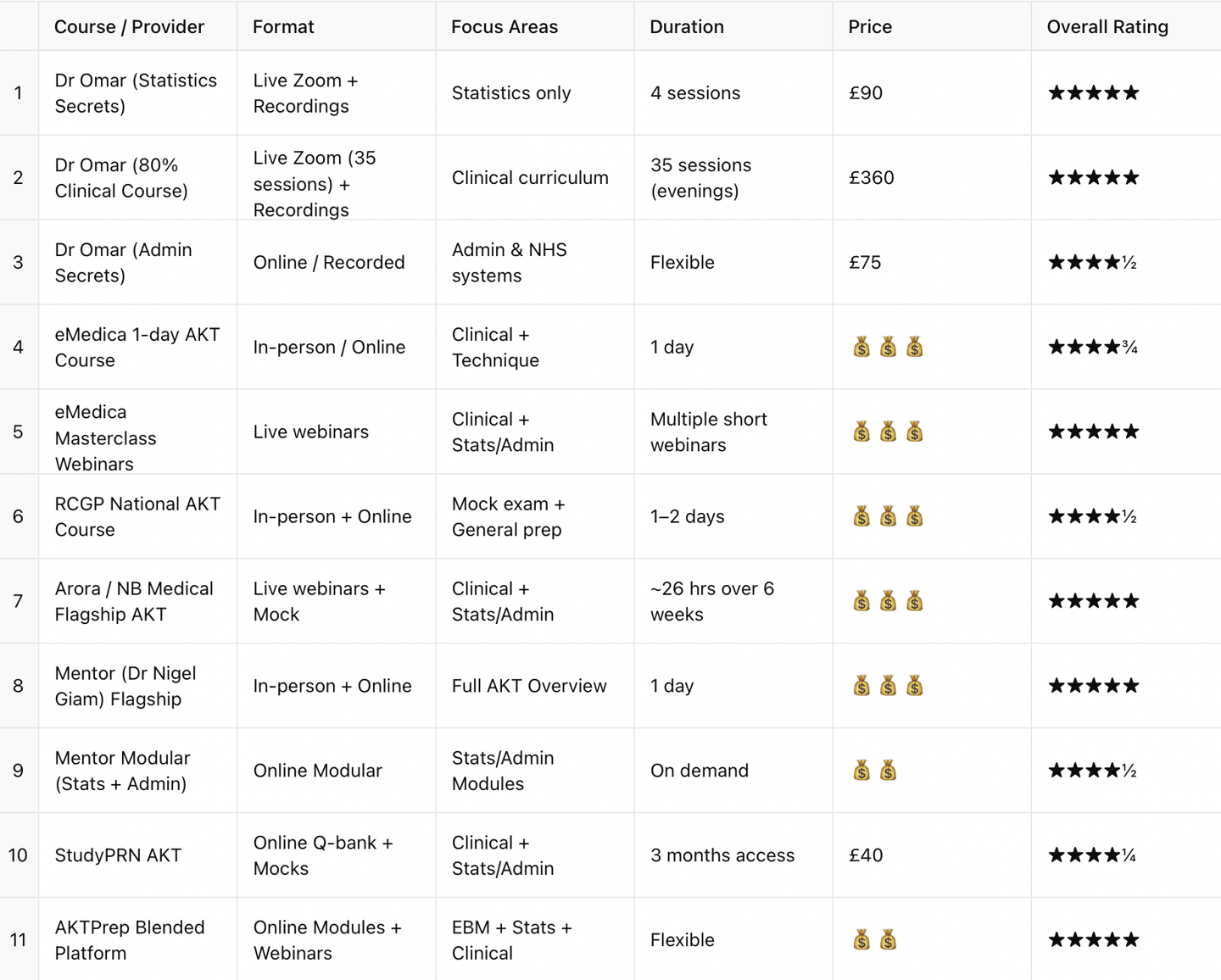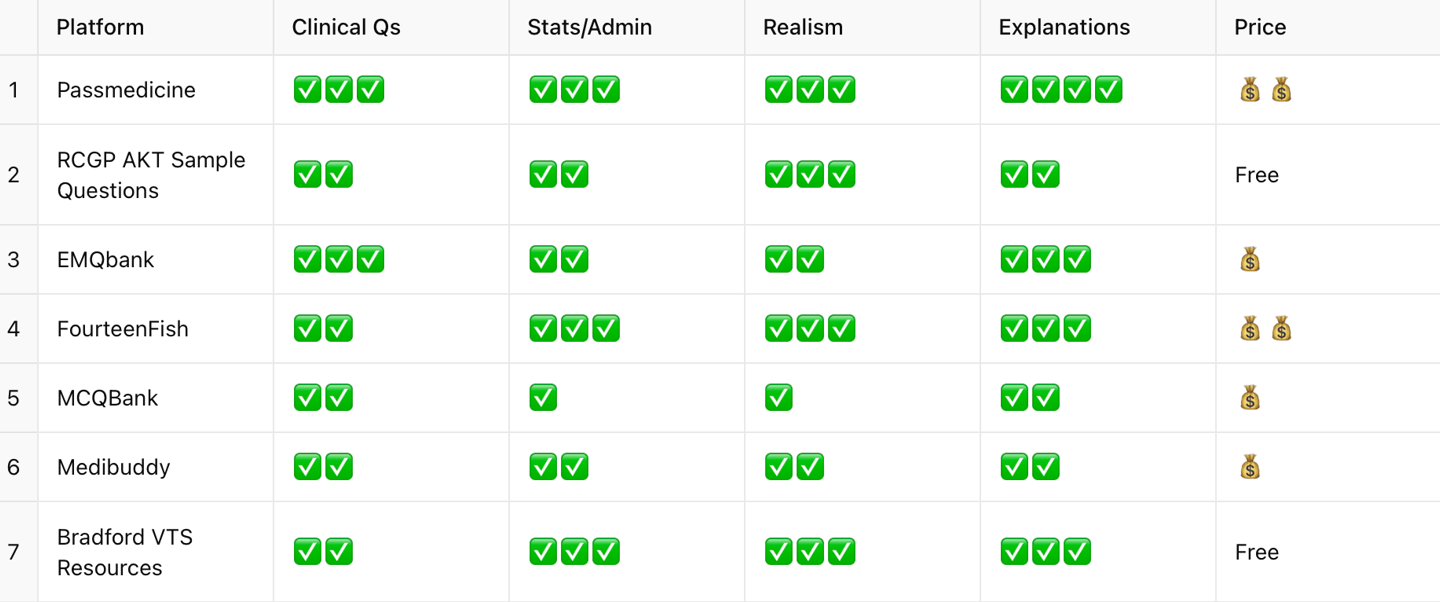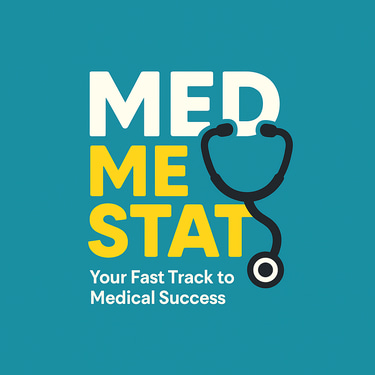
AKT Preparation Guide
In-depth overview of the AKT exam with a breakdown of question banks and prep courses.
🧠 What is the AKT?
The AKT is one of three components of the MRCGP (Membership of the Royal College of General Practitioners)exam, alongside the SCA (formerly CSA) and WPBA.
It is a computer-based, knowledge-based exam testing clinical knowledge relevant to UK general practice.
📅 AKT Exam Overview
Eligibility: Open to GP trainees in ST2 or ST3
Exam Frequency: Held three times annually – in January, April, and October
Format: Computer-based test comprising 200 multiple-choice questions
Duration: 3 hours and 10 minutes
Passing Score: Typically around 70%, though it may vary by sitting
Attempt Limit: Up to four attempts permittedMaximum of 4
📘 AKT Syllabus Breakdown
Clinical Medicine (~80%)
Covers areas such as chronic disease management, acute presentations, prescribing, and day-to-day primary care conditions.Evidence Interpretation & Statistics (~10%)
Includes topics like study types, sensitivity and specificity, number needed to treat (NNT), and p-values.Admin / Organisational (~10%)
Encompasses knowledge of NHS systems, DVLA regulations, death certification, information governance, and related protocols.
📊 AKT Marking & Results
Results available within ~4 weeks
Scaled score out of 200
No pass/fail by section, but weakness in stats/admin can cause failure
🧰 Top AKT Question Banks (2025)
🧠 Comprehensive Comparison of AKT Preparation Courses
Please note that the majority of candidates pass the AKT by solely using an MCQ question bank and revising national guidelines, without the need for additional courses, while applying their knowledge in day-to-day primary care practice through real patient encounters.
🔑 Most Popular Picks
✅ Passmedicine AKT
🏆 Most Recommended
✅ Regularly updated in line with NICE and BNF
✅ Strong coverage of statistics and admin topics
✅ Sufficient clinical content to pass the AKT🔸 Can feel repetitive at times
🔸 Some questions are vague or not clearly aligned with the AKT exam
✅ RCGP GP Self Test + Free AKT Sample Questions
🆓 Free Practice Sets with Feedback
✅ Simulates real exam format closely
✅ Offers performance feedback after each block🔸 Limited explanations for answers
🔸 Questions only available in fixed blocks of 20
✅ FourteenFish
Mock exam simulation
Great if you need to build up timing and exam strategy
🧠 Preparation Tips
Start 3–4 months before your exam
Use 2 question banks: Passmedicine + 1 extra (e.g. Passmedicine and GP Self test)
Practice stats/admin daily
Work through RCGP AKT Feedback Reports for high-yield topics
Revise NICE CKS, BNF, SIGN, and local guidelines
🎯 High-Yield Topics
Contraception, child health, dermatology
Emergency medicine, red flags
Mental health, safeguarding
Driving regulations (DVLA), Fit notes
Interpretation of data (e.g. graphs, audit)




My AKT Exam Experience: A Practical Approach to a Practical Exam
I recently sat the Applied Knowledge Test (AKT), and if there’s one thing I’ve taken away from it, it’s this: the AKT is a very practical exam. It tests how you apply knowledge in real-life general practice scenarios — but there’s a twist. Despite its practical nature, there are areas that feel more like academic exercises, especially statistics.
Statistics in the AKT: Know It, Even If You Don’t Use It
In day-to-day GP life, we rarely have to engage directly with statistics like funnel plots or forest plots. The reality is, our practice is guided by national guidelines, and those guidelines are already based on solid evidence and statistical analysis. So, in real life, we’re not calculating NNTs — we’re following NICE recommendations that have already done that work.
However, for the AKT, stats matter. You need to understand key concepts and basic calculations, including:
NNT (Number Needed to Treat)
NNH (Number Needed to Harm)
Mortality rate
Sensitivity and specificity
Mean, median, mode
Confidence intervals
Statistical plots and graphs
Even though it feels disconnected from clinical practice, brushing up on these concepts is crucial — they could make the difference between a pass and a fail.
Question Style: Short, Practical, and To the Point
One thing that surprised me was how concise the questions were. Compared to revision resources like Passmedicine, which often present long stems, the real AKT questions were much more streamlined. They’re designed to simulate real decisions you’d make in practice, so the key is reading carefully and thinking clinically.
Resources I Used: What Helped Me the Most
Passmedicine: This was the cornerstone of my preparation. While the question style differs slightly from the actual exam, the explanations are gold. They build your clinical knowledge and help you understand why certain answers are correct — something that goes a long way in a test designed to assess applied knowledge.
GP Self-Test (RCGP): These questions are very close to the real thing in terms of style and difficulty. They helped me get used to the question format and improved my confidence closer to the exam.
Don’t Skip the Guidelines
It goes without saying, but make sure you're up to date with national guidelines for major conditions — especially the common ones like:
Cardiovascular disease
Diabetes and endocrinology
Respiratory conditions
Mental health
And don’t forget DVLA guidelines — a commonly overlooked area but one that regularly appears in the AKT.
Where the Real Challenge Lies
Everyone tends to do well in the core clinical areas like cardiology, endocrinology, and respiratory medicine. The real challenge, in my experience, comes from the non-clinical areas — things we don’t deal with every day, like:
Child development and milestones
DVLA and fitness to drive rules
Admin and legal responsibilities
Dose calculations and drug conversions
Statistics and epidemiology
These areas often carry a surprising number of marks, and neglecting them can be costly. Focused revision here can give you the edge you need.
Final Thoughts: Be Smart and Strategic
You don’t have to be a genius to pass the AKT, but you do need to be practical and strategic. Use high-yield resources, don’t get bogged down by low-yield topics, and focus on your weaker areas.
Work smart, cover the guidelines, polish your stats, and approach the exam like you would a clinical scenario — calmly and logically. If you do that, you’ll be well on your way to passing.
